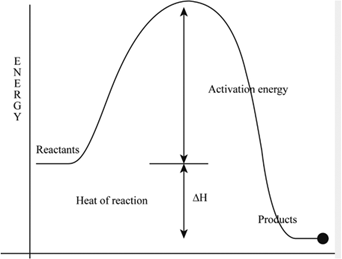Lately I’ve been thinking a lot about the concept of activation energy. In chemistry this is the notion of how much initial energy is required to get over an energy “hump” (that’s the technical term 😉) so that a reaction can proceed. Reactants start at one energy level and require an input of energy so they can go to a different state, often with different total energy. The difference in total energy is released as heat or stored as potential energy. This is obvious a gross over simplification but you get the idea.
 (photo from tekportal)
(photo from tekportal)
I think there’s a great parallel in every day life as well. Imagine you have 20 minutes of free time. Is it easier to pull out your smartphone and browse instagram for 20 minutes or pull out a book and read a chapter or two? Which would you probably be more happy you did in the long run?
I think habits, skill learning, and regular activities all can be modeled very similarly to activation energy curves from chemistry. The delta you need to get over the hump is the difficulty of starting the task and the difference in total energies is the long-term satisfaction that you feel from doing the task.
Another thing that you often find in chemistry is that this abstraction is used to model why catalysts make reactions more readily occur. Usually they’re modeled with a lower activation energy in the presence of a catalyst.
I think habits act similarly to a catalyst, in that they reduce activation energy and make certain actions more likely to occur in the same or similar settings. Lately I’ve grown so accustomed to pulling out my phone whenever I have any few minutes of free time and then just wasting it. I’d even argue that the product energy of mindlessly viewing useless sites on my phone is higher, meaning usually I wished that I didn’t ever pull out my phone to begin with, AKA it’s a regrettable action.
In Happiness Advantage by Shawn Achor1, the author discusses how just 15-20 seconds of added activation energy is sufficient to change your mind: moving the TV remote out of sight and the guitar into an easy-to reach stand in the living room is sufficient to get you into regular practicing habits.
Nothing changes if Nothing Changes
This all seems relatively obvious but I think it’s useful to state. The more mindful I am of how I’m spending my free times and what habitual catalysts I’m forming in my brain, I can more frequently reduce actions that I regret taking later on. Instead I can make actions that I am happy I did more likely to occur instead by the same habitual reasoning.